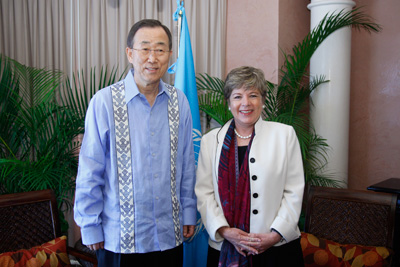United Nations Urges Negotiation on Climate Change in a Spirit of Compromise and Common Sense
Work area(s)
Topic(s)
Executive Secretary of ECLAC, Alicia Bárcena, moderated a special meeting held during the Summit held in Cancún, México.

(Cancún, 7 December 2010) The United Nations Secretary-General, Ban Ki-moon, today urged governments to be flexible and to negotiate in the spirit of compromise and common sense, for the good of all peoples.
"Let us not forget: Nature isn't waiting while we negotiate. Greenhouse gas emissions continue to rise. They are at unprecedented levels. Climate impacts are increasing. In just four decades, there will be nearly nine billion people on our planet. How will we meet the needs of nine billion people while at the same time reducing emissions by 50 per cent or more, as scientists tell us we must? We need to fundamentally transform the global economy -- based on low-carbon, clean energy resources", he said.
Ban Ki-moon participated today in the side event "The UN System Delivering as One on Climate Change: Supporting Implementation", held as part of the XVI Conference of the Parties to the United Nations Framework Convention on Climate Change (known as COP 16) taking place in Cancún, Mexico.
The meeting was moderated by the Executive Secretary of the Economic Commission for Latin America and the Caribbean (ECLAC), Alicia Bárcena, and was attended by panellists from around 29 UN agencies, known as the Chief Executives Board (CEB) of the United Nations.
Almost 500 people took part, including representatives of the governments attending COP 16, civil society and journalists.
"Beyond whether or not agreements are achieved in Cancún, there are many actions in countries on the ground that we must boost, and this is where the United Nations system can contribute", stressed Ms. Bárcena.
The Secretary-General of the UN stated that the organization is ready to help countries in their national efforts to mitigate and adapt to the phenomenon, as well as provide them with tools and knowledge to achieve sustainable, climate resistant and energy efficient growth.
The renowned panellists that took part in the event were as follows Ms. Christiana Figueres, UNFCCC Executive Secretary; H.E. Mr. Rachmat Witoelar, President's Special Envoy for Climate Change, Indonesia; Miss Helen Clark, Administrator, United Nations Development Programme; H.E. Ms. Maria Ignacia Benitez, Minister of Environment, Chile; Mr. Achim Steiner, Executive Director, United Nations Environment Programme; H.E. Mr. Erik Solheim, Minister of the Environment and International Development, Norway; Mr. Kandeh Yumkella, Director-General, United Nations Industrial Development Organization; H.E. Ms. Alcinda Antonio de Abreu, Minister of Coordination of Environmental Affairs, Mozambique; Mr. Michel Jarraud, Secretary-General, World Meteorological Organization; H.E. Mr. Mohammed Aslam, Minister of Housing and Environment, Republic of Maldives; and Ms. Inger Andersen, Vice-President, Sustainable Development Network, World Bank.
Participants underlined that tackling climate change may help countries to achieve their development objectives. For this to happen, it is vital to have available the financial resources, integrate climate actions in the planning of development programmes and for nations to have a genuine capacity for action.
They reiterated that the United Nations can help developing countries to mobilize the necessary financing, support the integration of policies within development planning processes and build capacity on the ground.
For more information and to request interviews, in Cancún your contact is María Amparo Lasso, Chief of the ECLAC Public Information and Web Services Section. Mariaamparo.lasso@cepal.org, +56979678306.
At the ECLAC Subregional Headquarters in Mexico City, please contact Pedro Cote, pedro.cote@cepal.org.
For other queries, please contact the ECLAC Public Information and Web Services Section in Santiago, Chile. E-mail: dpisantiago@cepal.org; telephone: (56 2) 210 2040.
Country(ies)
-
Mexico
Contact
Public Information Unit
- prensa@cepal.org
- (56 2) 2210 2040